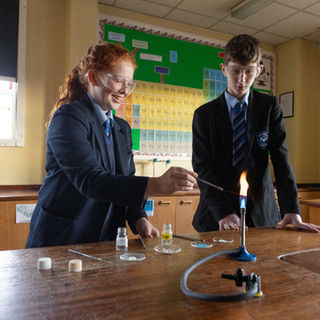
Chemistry
Welcome To The Chemistry Department
Chemistry is the study of matter—what it consists of, what its properties are, and how it changes. Being able to describe the ingredients in a cake and how they change when the cake is baked is called chemistry. Matter is anything that has mass and takes up space—that is, anything that is physically real. Some things are easily identified as matter— a book, for example. Others are not so obvious. Because we move so easily through air, we sometimes forget that it, too, is matter.

Chemistry Department: Aims
We as a department aim to:
-
help pupils enjoy Chemistry and develop a thirst for further knowledge in the subject,
-
develop pupil skill set that can be transferred to other areas throughout all aspects of life,
-
apply chemistry to help pupils understand natural processes in the world around them,
-
solve problems, present solutions clearly and interpret results to form concise, accurate conclusions,
-
develop the ability to reason logically, classify and prove hypothesis,
-
develop qualities of co-operation, flexibility & teamwork.
Chemistry Department:
Subject Overview
Key Stage 4
Within Chemistry there are two options of study at KS4:
-
Double Award Science or
-
Triple Award Chemistry.
Double Award GCSE Science
The DA Science specification is unitised and includes seven units across Biology, Chemistry & Physics.
Three of these units are Chemistry units.
Unit C1 is taught in year 11 and covers the basics in chemistry. Topics such as atomic structure & bonding, formula & equations, chemical reactions, the Periodic table and chemical calculations are covered .
In year 12, unit C2 covers topics like the reactivity series of metals, redox reactions, rates of reaction, equilibrium, organic chemistry, quantitative chemistry, electrochemistry, energy changes and gas chemistry.
The third section Unit 7 is a practical skills unit.
Triple Award GCSE Chemistry
The GCSE Chemistry specification is unitised and includes three units.
Unit C1 is taught in year 11 and covers the basics in chemistry. Topics such as atomic structure & bonding, formula & equations, chemical reactions, the Periodic table and chemical calculations are covered.
In year 12, unit C2 covers topics like the reactivity series of metals, redox reactions, rates of reaction, equilibrium, organic chemistry, quantitative chemistry, electrochemistry, energy changes and gas chemistry.
Unit 3 is a practical skills unit.
Key Stage 5
The minimum qualification for this course is BB at GSCE Double Award Science with a grade B in your terminal year 12 paper (same applies to GCSE Chemistry).
Throughout the course you will build on your GCSE knowledge and develop a deeper understanding of the atom and the properties and analysis of different substances. You will also be developing your practical skills and ability to work with others as you and your peers synthesise and analyse many different substances.
Unit AS1: Basic Concepts in Physical and Inorganic Chemistry
Unit AS 2: Further Physical and Inorganic Chemistry and an Introduction to Organic Chemistry
Unit AS 3: Basic Practical Chemistry
Unit A2 1: Further Physical and Organic Chemistry
Unit A2 2: Analytical, Transition Metals, Electrochemistry and Organic Nitrogen Chemistry
Unit A2 3: Further Practical Chemistry
Chemistry Department: Careers
Chemistry Department: Gallery





